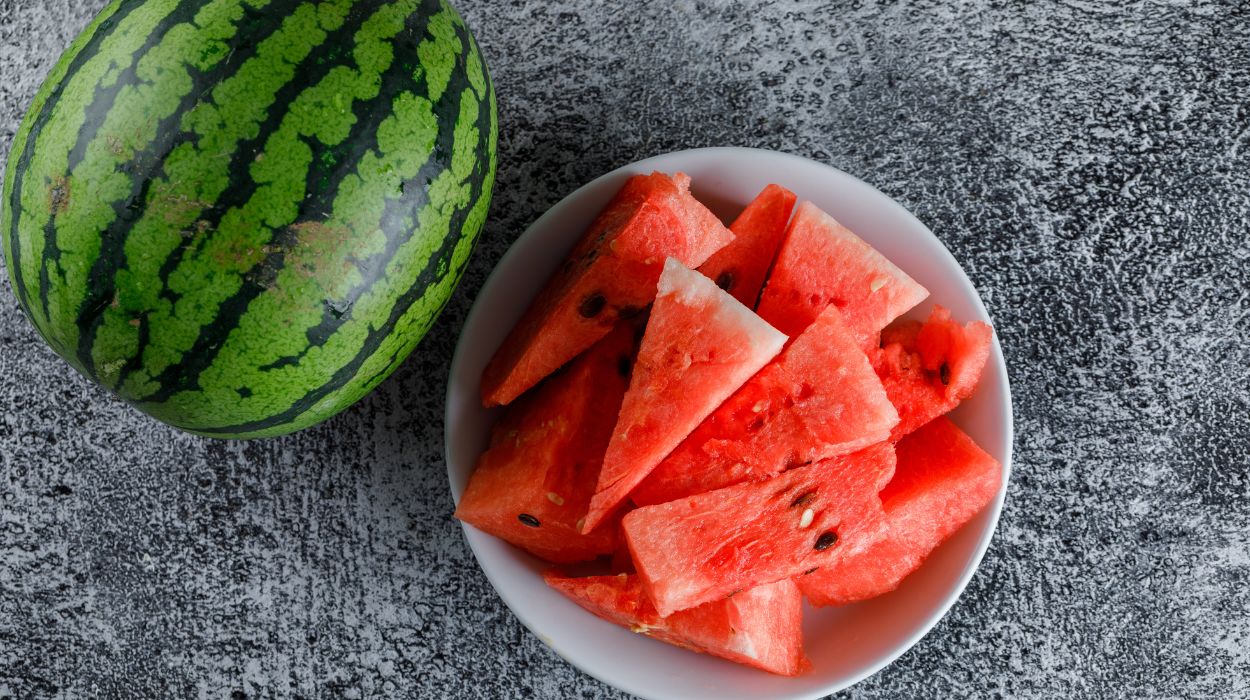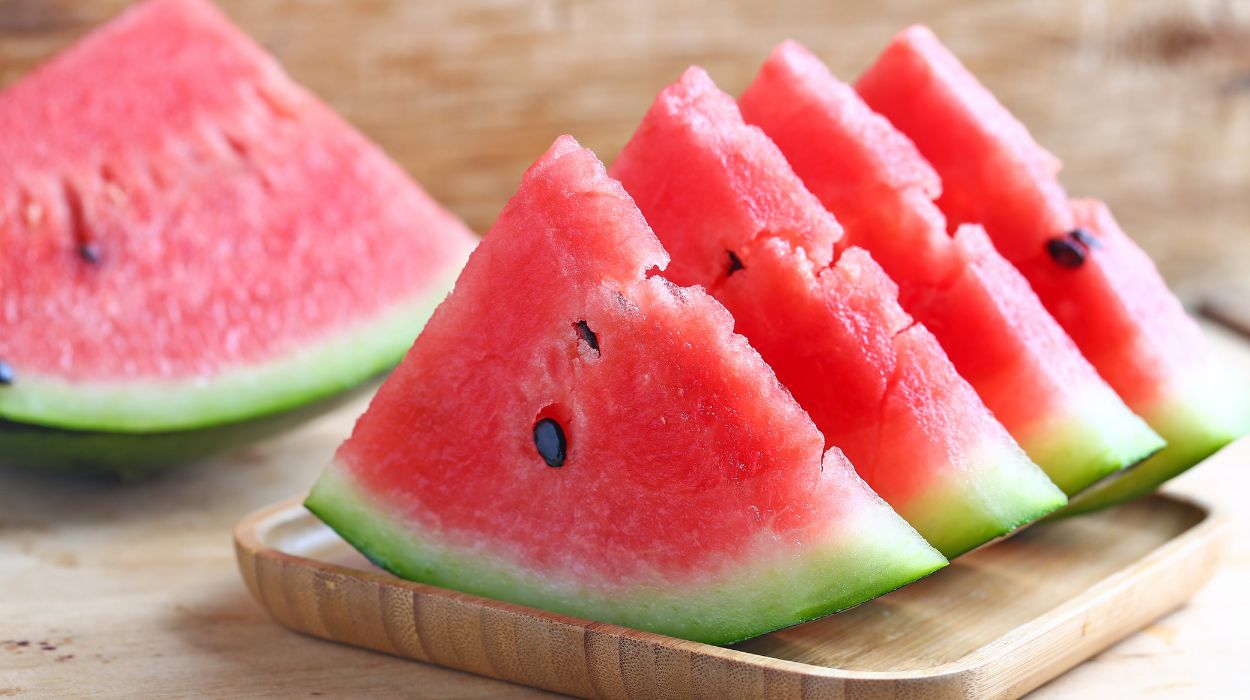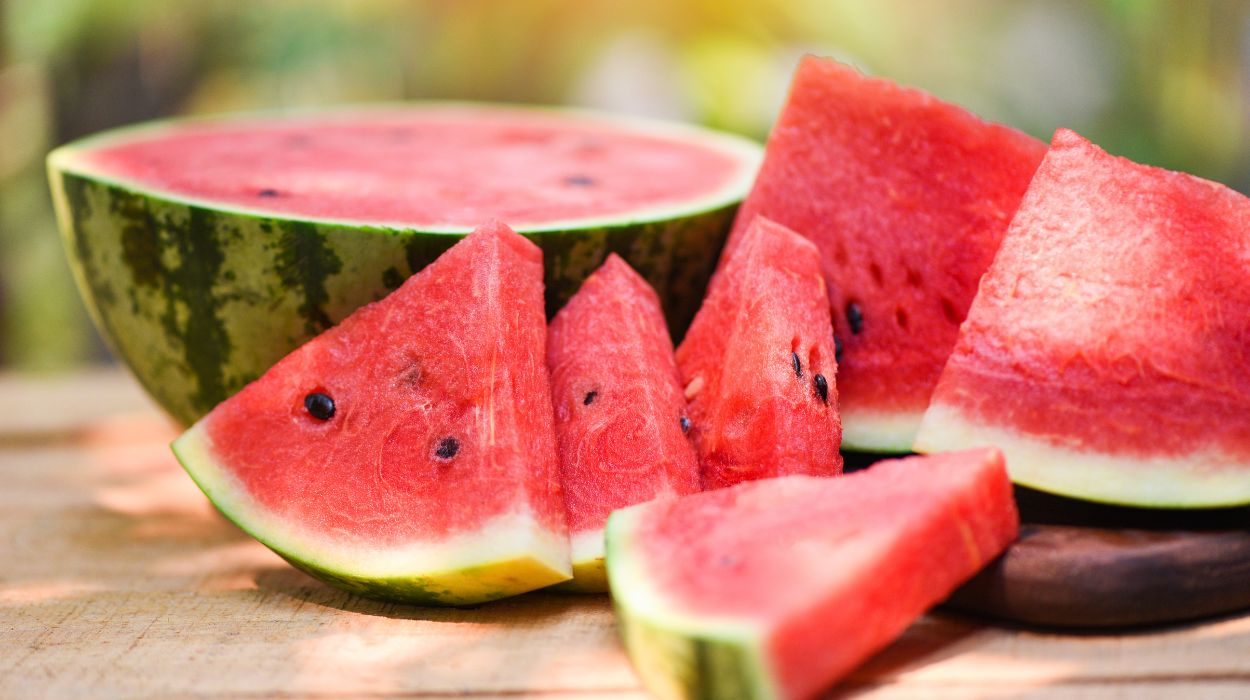 Evidence Based
Evidence Based
Evidence Based
This article is objectively based on relevant scientific literature, written by experienced medical writers, and fact-checked by a team of degreed medical experts.
Our team of registered dietitian nutritionists and licensed medical professionals seek to remain objective and unbiased while preserving the integrity of any scientific debate.
The articles contain evidence-based references from approved scientific sites. The numbers* in parentheses (*1,2,3) will take you to clickable links to our reputable sources.
10 Benefits Of Watermelon & Nutrition Facts 2024

Nothing says summer more than eating a juicy slice of ripe watermelon outside in the sunshine. What’s better is this refreshing summer staple is full of nutrients. Read on to check out the top 10 health benefits of watermelon.
10 Benefits Of Watermelon
- Improved gut health
- Hydration
- Essential nutrients
- Improved circulation
- Weight loss
- Metabolism
- Cancer
- Heart health
- Women’s health
- Men’s health
Top 10 Health Benefits Of Watermelon

Read on to know why watermelon should be a staple in your house in the summer and year-round!
Improved Gut Health
While watermelon doesn’t contain large amounts of fiber, it is chock full of water, antioxidants, and nutrients. Together these three ingredients are just what your digestive tract needs to stay healthy.
Water helps to digest and break down foods consumed. Water can also help to process nutrients by helping the small intestines to absorb moisture and thus move nutrients throughout your bloodstream quicker.
The small amount of fiber found in watermelon also helps your digestive system by increasing the bulk in your stool. Having a larger stool makes it easier to move through your intestines. But it is the high water content that makes moving your bowels easier.
Hydration
Watermelon and cantaloupe contain the most water of any other fresh fruit and vegetable. Watermelon is around 92-99%[1] water and has so many health benefits! And water does way more for our health than just keeping us from being parched.
Here are some reasons why water is essential to our health.
- Temperature regulation
- Helps safeguard organs
- Transports oxygen to the cells
- Removes toxins from the body
- Breaks down and digests vitamins and minerals
- Cushions joints
- Regulates appetite
According to research[2], 75% of Americans are chronically dehydrated. Even mild dehydration (1-2%) can cause you to feel tired and lightheaded. The water inside watermelon flesh is a delicious way to ensure you receive hydration benefits year-round. Eating only one cup of watermelon provides over a half cup of water.
Essential Nutrients
Watermelon contains an essential nutrient called choline. An essential nutrient is one your body cannot create itself or cannot make enough of on its own. Therefore you must give your body those nutrients through food. Choline is vital as it is involved in many functions[3], including:
- Metabolism
- Memory
- Mood
- Muscle control
- Fetal brain development
- Cell structure
- Nervous system functions
- Immune system functions
- Keeping inflammation in control
About 95% of pregnant[3] women do not consume enough choline. What’s more, is that most prenatal vitamin and mineral supplements contain very little if any choline. Therefore, watermelon juice enriched with choline may be a healthy refresher for pregnant women to help them achieve healthy digestion.
Of note, other dietary sources of choline[3] include; eggs, chicken, soybeans, ground beef, and chicken breast.
Improved Circulation
You’ve probably never considered how consuming watermelon could benefit you sexually, but it can! L-citrulline is an amino acid that is abundant in watermelon.
Once in the body, L-citrulline is turned into L-arginine (an amino acid). The primary job of L-arginine is to enhance blood flow by helping your blood vessels expand. Erectile dysfunction is primarily due to a lack of blood flow to the male genitalia.
An analysis of 10 studies[4] showed that arginine supplements (ranging from 1,500 to 5,000 mg dosage) significantly improved erectile dysfunction.
Participants who received the supplements of arginine also had increased scores of overall sexual satisfaction and orgasmic function. L-arginine also increases nitric oxide, which dilates blood vessels and increases erections.
Unfortunately, to get the same amount of L-citrulline from a watermelon that you would need to help with erectile dysfunction (ED) would be a lot. A typical dose of citrulline for ED is 1,000mg three times daily.
The highest concentration of L-citrulline is in the rind. The amount found here is about 24.7mg per gram[5]. Meanwhile, the amount found in the red flesh contains less L-citrulline at 7.4mg per gram.
Since most sexual health benefits are found in the watermelon rind, the easiest way to reap these benefits is by blending the rind with the bright red flesh of the watermelon to achieve your desired L-citrulline levels. Eating the rind also helps slow down sugar absorption, thus keeping blood sugars more stable.
L-citrulline is also beneficial for athletes as it eases muscle soreness by increasing blood flow to the injured muscle cells and helps reduce inflammation[6].
Weight Loss
As you might recognize, fresh watermelon consumption can also benefit your weight loss efforts. Watermelon mainly consists of water.
Therefore, it has very few calories. You can enjoy two huge cups of fresh watermelon for less than 100 calories. Watermelon is an excellent low-calorie snack for overweight and obese adults.
Also, packed away in those sugary-tasting cubes is a ton of nutrients, including vitamins A, B, and C, as well as lycopene.
Meaning, that your watermelon snack will fill you up because of all the water but not fill your body with many calories. Adding watermelon to your daily snack regimen is a great way to lose a few pounds.
Metabolism
There are not only benefits in the watermelon flesh and rind but also the seeds! Watermelon seeds are exploding with nutrients such as
- Iron
- Zinc
- Copper
- Folate
- Magnesium
- Potassium
- Protein
- B vitamins
All of these nutrients help several areas of your body. But, B vitamins and magnesium are essential when it comes to metabolism. Over 300 enzymes[7] are reliant on magnesium to be able to function correctly!
To reap the benefits of the watermelon seed, you can either eat them raw (white seeds are much softer to eat, but black seeds can also be eaten raw) or dry and roast them in the oven.
Once prepared, you may use them in any dish as you would other seeds, such as on top of salads, in smoothies, in trail mixes, or on top of yogurt.
Cancer
The National Cancer Institute[8] has long warned people about the danger of free radicals in our bodies. Free radicals are nasty molecules that are unstable and damage other healthy cells. They are made during cell metabolism. If your body has many free radicals, it can lead to cancer, heart disease, premature aging, and other chronic diseases.
Our greatest ally in fighting free radicals is eating fruits and vegetables with high antioxidants. Antioxidants protect your body against free radicals. Thankfully, fresh watermelon is very high in three different antioxidants; vitamin C, beta-carotene, and lycopene.
To get the most antioxidant benefits to try yellow watermelon. Yellow watermelon has slightly more antioxidants than red watermelon. Several yellow varieties are available such as; buttercup, desert gold, gold in gold, and many more.
Heart Health
Watermelon contains an antioxidant-rich phytonutrient called lycopene. Due to its antioxidant and anti-inflammatory properties, research[9] has proven that lycopene helps improve many cardiovascular functions. Some effects of lycopene intake on cardiovascular health include:
- Anticoagulation of blood cells
- Antihypertensive properties
- Improved blood vessel health
- Reduction of plaque build-up in the arteries
Watermelon contains no salt, added sugar, cholesterol, or fat. Currently, research on heart disease prevention that might include lycopene is still relatively new. However, preliminary research findings are very exciting.
Women’s Health
Some benefits of consuming watermelon are more specific to women’s health. For example, eating watermelon during your period can help you to feel less bloated. This anti-bloating effect is due to its low sodium content.
Another benefit more geared towards women is that of drinking watermelon juice. Watermelon juice can be a great low-calorie yet high-nutrient post-workout beverage for those wanting to rehydrate and nourish their body with electrolytes such as potassium without the added calorie consumption.
Lastly, watermelon can aid in skin health due to its vitamin C content. Vitamin C[10] is vital to collagen production. Collagen’s primary role is to keep your skin soft, taut, hydrated, and elastic. All of the key players for healthy skin. It also helps skin cells restore and rebuild.
Watermelon juice mixed with lemon and ginger can cleanse the liver and kidney and serve as a beauty ritual with its anti-aging properties.
Men’s Health
There are also some benefits of consuming watermelon that is more specific to men’s health. In addition to the sexual health mentioned previously, consuming watermelon can protect[11] against prostate cancer. This protection is due to the antioxidant powerhouse lycopene.
Watermelon Nutrition Facts

Here is the nutrition[12] breakdown of 1 cup of diced watermelon
- Calories: 45
- Fat: 0 grams
- Protein: 1 gram
- Fiber: 0.5 grams
- Sodium: 0 mg
- Choline: 6 mg
- Vitamin C: 12 mg (14% of the daily value)
- Vitamin A: 865 IU (5% of the daily value)
The Bottom Line – Is Eating Watermelon Good for You?
Watermelon isn’t just a treat for your sweet tooth on a hot day. This fruit can also help your metabolism, circulation, heart, and gut and provide you with tons of nutrients.
To increase watermelon’s benefits, consume it on an empty stomach. When you drink water or consume high water content foods on an empty stomach, your body can absorb all the compounds and nutrients more effectively[13].
So next time you see that delicious red fruit, go for seconds (or thirds!).
+ 13 sources
Health Canal avoids using tertiary references. We have strict sourcing guidelines and rely on peer-reviewed studies, academic researches from medical associations and institutions. To ensure the accuracy of articles in Health Canal, you can read more about the editorial process here
- Popkin, B.M., D’Anci, K.E. and Rosenberg, I.H. (2010). Water, hydration, and health. Nutrition Reviews, [online] 68(8), pp.439–458. doi:10.1111/j.1753-4887.2010.00304.x.
- Taylor, K. and Jones, E.B. (2022). Adult Dehydration. [online] Nih.gov. Available at: https://www.ncbi.nlm.nih.gov/books/NBK555956/
- Nih.gov. (2017). Office of Dietary Supplements – Choline. [online] Available at: https://ods.od.nih.gov/factsheets/Choline-HealthProfessional/.
- Rhim, H.C., Kim, M.S., Park, Y.-J., Choi, W.S., Park, H.K., Kim, H.G., Kim, A. and Paick, S.H. (2019). The Potential Role of Arginine Supplements on Erectile Dysfunction: A Systemic Review and Meta-Analysis. The Journal of Sexual Medicine, [online] 16(2), pp.223–234. doi:10.1016/j.jsxm.2018.12.002.
- Rimando, A.M. and Perkins-Veazie, P.M. (2005). Determination of citrulline in watermelon rind. Journal of Chromatography A, [online] 1078(1-2), pp.196–200. doi:10.1016/j.chroma.2005.05.009.
- Yamagishi, Y., Someya, A. and Nagaoka, I. (2020). Citrulline cooperatively exerts an anti‑inflammatory effect on synovial cells with glucosamine and N‑acetylglucosamine. Biomedical Reports, [online] 13(1), pp.37–42. doi:10.3892/br.2020.1304.
- Swaminathan, R. (2003). Magnesium metabolism and its disorders. The Clinical biochemist. Reviews, [online] 24(2), pp.47–66. Available at: https://www.ncbi.nlm.nih.gov/pmc/articles/PMC1855626/
- National Cancer Institute. (2017). Antioxidants and Cancer Prevention. [online] Available at: https://www.cancer.gov/about-cancer/causes-prevention/risk/diet/antioxidants-fact-sheet
- Mozos, I., Stoian, D., Caraba, A., Malainer, C., Horbańczuk, J.O. and Atanasov, A.G. (2018). Lycopene and Vascular Health. Frontiers in Pharmacology, [online] 9. doi:10.3389/fphar.2018.00521.
- BOYERA, N., GALEY, I. and BERNARD, B.A. (1998). Effect of vitamin C and its derivatives on collagen synthesis and cross-linking by normal human fibroblasts. International Journal of Cosmetic Science, [online] 20(3), pp.151–158. doi:10.1046/j.1467-2494.1998.171747.x.
- Chen, P., Zhang, W., Wang, X., Zhao, K., Negi, D.S., Zhuo, L., Qi, M., Wang, X. and Zhang, X. (2015). Lycopene and Risk of Prostate Cancer. Medicine, [online] 94(33), p.e1260. doi:10.1097/md.0000000000001260.
- Usda.gov. (2022). FoodData Central. [online] Available at: https://fdc.nal.usda.gov/fdc-app.html#/food-details/167765/nutrients
- Jeong, J.N. (2018). Effect of Pre-meal Water Consumption on Energy Intake and Satiety in Non-obese Young Adults. Clinical Nutrition Research, [online] 7(4), p.291. doi:10.7762/cnr.2018.7.4.291.



